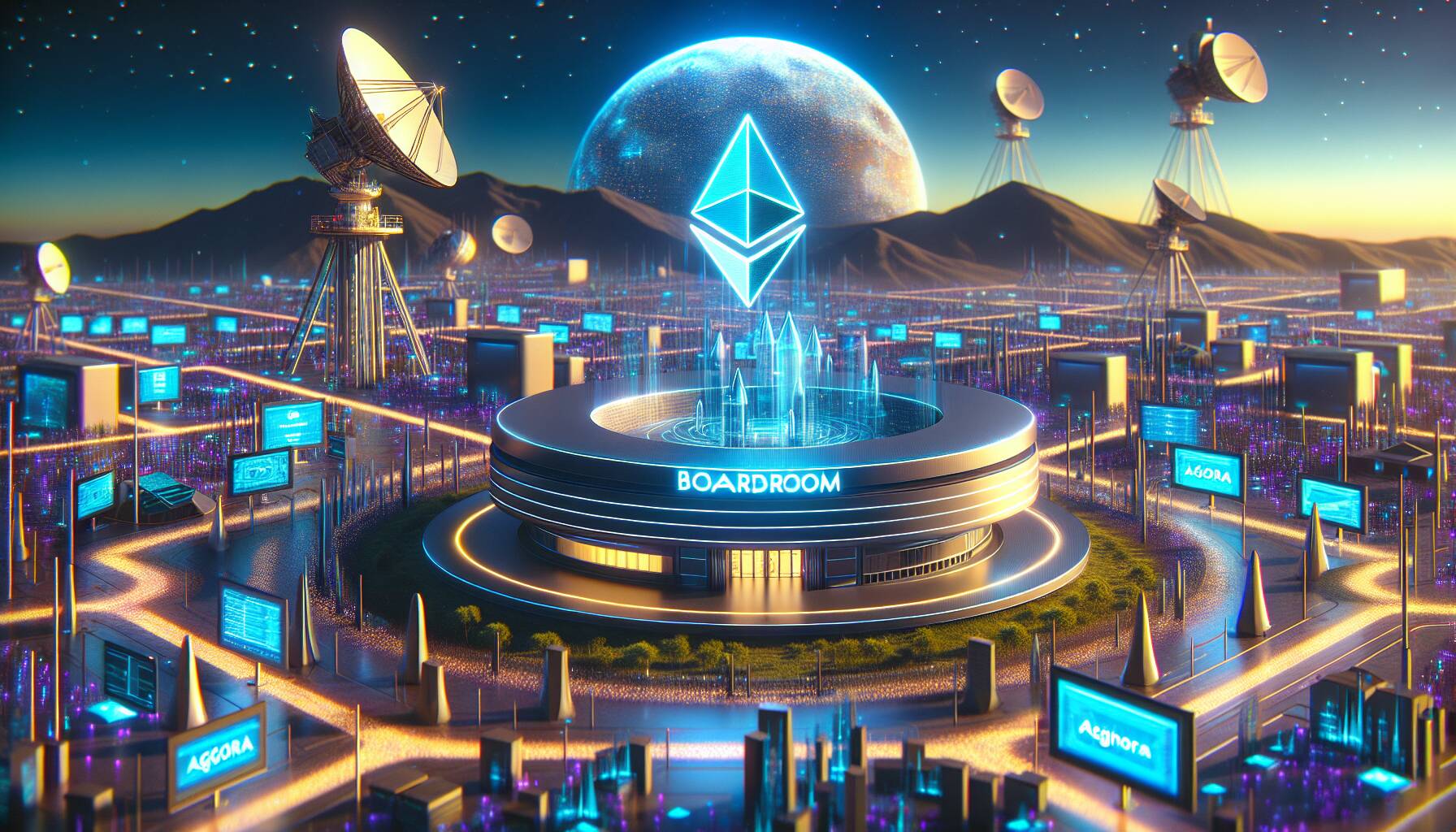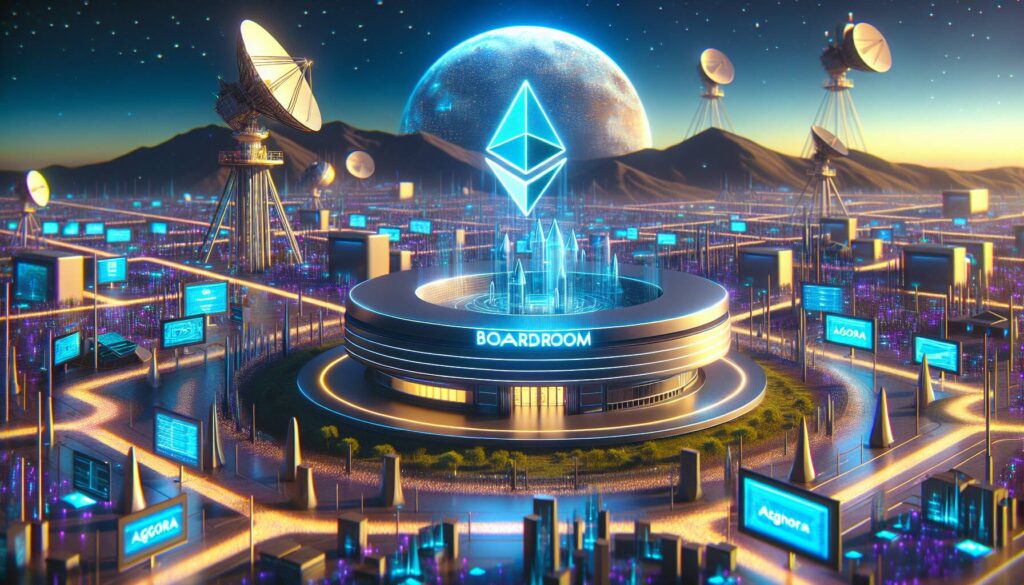In a significant development within the cryptocurrency landscape, Agora, a blockchain governance startup, has announced plans to acquire its rival, Boardroom. This strategic acquisition is anticipated to elevate governance capabilities across the Ethereum ecosystem at a time when there is renewed interest in decentralized governance. Agora’s co-founder, Yitong Zhang, emphasized the transformative potential of this merger, particularly in light of recent political developments, including promises from the Trump administration to provide clearer regulatory guidelines for the blockchain industry. “2025 is the year we make good governance the standard for all protocols in Ethereum,” Zhang stated during an interview with CoinDesk.
Founded in 2022 by Zhang, along with co-founders Charlie Feng and Kent Fenwick, Agora is rooted in the belief that effective token governance is vital to the intrinsic value of cryptocurrency protocols. The team previously honed their skills at Nouns DAO, a prominent decentralized autonomous organization that gained traction during the NFT and DAO boom of 2021. With tools aimed at facilitating easier governance for DAOs like Uniswap and Optimism, Agora has positioned itself as a critical player in the fast-evolving world of token-based governance.
Boardroom, which had established itself prior to Agora’s entry, initially focused on DAO tooling but has since pivoted towards providing aggregated data—functioning much like a “Bloomberg” specifically for crypto governance. Agora chose not to disclose the financial details of the acquisition but has indicated that Boardroom’s team will transition into new roles within Agora, with founder Kevin Nielsen remaining as an advisor. “There’s no plan to deprecate Boardroom,” assured Zhang, who said both platforms will continue to operate and evolve in tandem while seeking input from users on future integrations.
The discussion of DAOs has shifted significantly since their peak popularity, with many struggling due to coordination challenges among token holders. The push for improved governance tools is only one aspect of the broader challenges facing DAOs; regulatory uncertainty has also contributed to inefficiencies in how these organizations operate. Zhang observed that despite setbacks and skepticism surrounding DAOs, he has witnessed substantial growth—an impressive “10X” increase in business over the past year. As the industry looks toward a future with clearer regulations, there is a mutual sense of optimism that DAO frameworks can regain traction. “I think we’re gonna finally get reasonable definitions for sufficient decentralization, security, and compliant ways of doing a token,” Zhang added, highlighting the critical intersection of governance and regulation in shaping the future of blockchain technology.

Agora’s Strategic Acquisition of Boardroom: Impact on the Ethereum Governance Landscape
Agora, a blockchain governance startup, is poised to make significant changes in the Ethereum ecosystem through its acquisition of Boardroom. Here are the key points regarding this development:
- Acquisition Details
- Aim to enhance governance within the Ethereum ecosystem.
- Specific acquisition terms undisclosed, but Boardroom’s team integrated into Agora.
- Both platforms will continue to operate concurrently.
- Background and Founders
- Agora founded in 2022 by Yitong Zhang, Charlie Feng, and Kent Fenwick.
- Initial work on governance tooling at Nouns DAO, reflecting the growing interest in DAOs.
- DAO Ecosystem Growth
- Renewed interest in decentralized governance anticipated due to potential regulatory clarity from the Trump administration.
- 2025 is projected to be a pivotal year for established governance standards in Ethereum protocols.
- Strategies for Enhancing Governance
- Improving DAO tooling to facilitate better coordination among token holders.
- A need for clearer regulations to address legal liabilities and token issuance processes.
- Market Sentiment and Business Potential
- Zhang’s assertion that DAOs are experiencing a resurgence in business viability.
- Higher expectations for DAO functionalities and regulations creating a more conducive environment for growth.
“There’s no plan to deprecate Boardroom… The trajectory of DAOs is changing with advancements in governance standards and regulatory clarity.”
Agora’s Strategic Acquisition of Boardroom: A New Era for DAO Governance?
Agora’s recent acquisition of Boardroom marks a pivotal moment in the evolution of blockchain governance platforms. This strategic move not only consolidates two significant entities within the Ethereum ecosystem but also positions Agora at a competitive advantage. With President Trump’s promise of regulatory clarity on the horizon, Agora emphasizes the potential for growth in decentralized governance, aiming to standardize good practices by 2025 across Ethereum protocols. While this presents an exciting opportunity for Agora, it also reveals a more complicated landscape for other players in the industry.
Competitive Advantages: Agora’s intention to maintain Boardroom as a separate entity while integrating its capabilities is a smart approach. This dual strategy allows Agora to leverage Boardroom’s established user base and data-rich environment while fortifying its governance tools for existing partnerships with DAOs like Uniswap and Optimism. By combining these strengths, Agora can offer a more comprehensive suite of services, potentially attracting larger organizations that require robust governance solutions and seamless user experience. The fresh optimism surrounding regulatory clarity may also draw in new users who had previously been hesitant to engage with DAOs due to uncertainty in legal frameworks.
Competitive Disadvantages: However, this acquisition may pose challenges for Agora. The transition of Boardroom from a DAO tooling software to a governance data provider has led it to adopt a more horizontal approach, which might not align with Agora’s centralized governance ethos. This divergence could confuse existing users of both platforms if not managed well. There is also a risk that, while attempting to enhance the governance landscape, Agora could inadvertently stifle the diverse and innovative spirit that many DAOs thrive on, as they may feel pressured to conform to standardized practices rather than embracing their unique governance styles.
This acquisition could particularly benefit traditional corporate entities looking to navigate the blockchain space, offering them the reassurance of structured governance practices. Established companies might see the integration of Agora and Boardroom’s capabilities as a way to mitigate the risks associated with decentralized governance by providing reliable analytics and user-friendly governance tools. However, competitors that focus on niche DAO solutions could face problems if Agora’s comprehensive approach captures a significant share of the market, limiting their growth potential in a sector ripe for innovation.
As Agora embraces this transformation, the question looms: will it usher in a new era of effective governance for DAOs, or will the challenges of standardization hinder the essence of decentralization? Only time will tell if this acquisition will spark the resurgent growth that Agora envisions, or if complexities will lead to unforeseen setbacks for both the acquiring and acquired parties alike.















